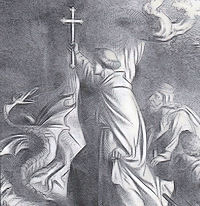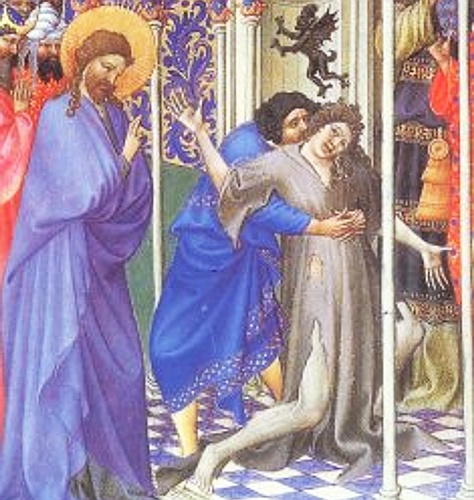September 2, 2014
Tuesday of the Twenty-second Week in Ordinary Time
Brothers and sisters:
The Spirit scrutinizes everything, even the depths of God.
Among men, who knows what pertains to the man
except his spirit that is within?
Similarly, no one knows what pertains to God except the Spirit of God.
We have not received the spirit of the world
but the Spirit who is from God,
so that we may understand the things freely given us by God.
And we speak about them not with words taught by human wisdom,
but with words taught by the Spirit,
describing spiritual realities in spiritual terms.
Now the natural man does not accept what pertains to the Spirit of God,
for to him it is foolishness, and he cannot understand it,
because it is judged spiritually.
The one who is spiritual, however, can judge everything
but is not subject to judgment by anyone.
For “who has known the mind of the Lord, so as to counsel him?”
But we have the mind of Christ.
R. (17) The Lord is just in all his ways.
The LORD is gracious and merciful,
slow to anger and of great kindness.
The LORD is good to all
and compassionate toward all his works.
R. The Lord is just in all his ways.
Let all your works give you thanks, O LORD,
and let your faithful ones bless you.
Let them discourse of the glory of your Kingdom
and speak of your might.
R. The Lord is just in all his ways.
Making known to men your might
and the glorious splendor of your Kingdom.
Your Kingdom is a Kingdom for all ages,
and your dominion endures through all generations.
R. The Lord is just in all his ways.
The LORD is faithful in all his words
and holy in all his works.
The LORD lifts up all who are falling
and raises up all who are bowed down.
R. The Lord is just in all his ways.
Jesus went down to Capernaum, a town of Galilee.
He taught them on the sabbath,
and they were astonished at his teaching
because he spoke with authority.
In the synagogue there was a man with the spirit of an unclean demon,
and he cried out in a loud voice,
“What have you to do with us, Jesus of Nazareth?
Have you come to destroy us?
I know who you are–the Holy One of God!”
Jesus rebuked him and said, “Be quiet! Come out of him!”
Then the demon threw the man down in front of them
and came out of him without doing him any harm.
They were all amazed and said to one another,
“What is there about his word?
For with authority and power he commands the unclean spirits,
and they come out.”
And news of him spread everywhere in the surrounding region.
31. And came down to Capernaum, a city of Galilee, and taught them on the sabbath days.
32. And they were astonished at his doctrine: for his word was with power.
33. And in the synagogue there was a man, which had a spirit of an unclean devil, and cried out with a loud voice,
34. Saying, Let us alone; what have we to do with you, you Jesus of Nazareth? are you come to destroy us? I know you who you are; the Holy One of God.
35. And Jesus rebuked him, saying, Hold your peace, and come out of him. And when the devil had thrown him in the midst, he came out of him, and hurt him not.
36. And they were all amazed, and spoke among themselves, saying, What a word is this! for with authority and power he commands the unclean spirits, and they come out.
37. And the fame of him went out into every place of the country round about.
AMBROSE; Neither indignation at their treatment, nor displeasure at their wickedness, caused our Lord to abandon Judea, but unmindful of His injuries, and remembering mercy, at one time by teaching, at another by healing, He softens the hearts of this unbelieving people, as it is said, And he went down to Capernaum.
CYRIL; For although He knew that they were disobedient and hard of heart, He nevertheless visits them, as a good Physician tries to heal those who are suffering from a mortal disease. But He taught them boldly in the synagogues, as Esaias said, I have not spoken in secret, in a dark place of the earth. On the sabbath day also He disputed with them, because they were at leisure. They wondered therefore at the mightiness of His teaching, His virtue, and His power, as it follows, And they were astonished at his doctrine, for his word was with power. That is, not soothing, but urging and exciting them to seek salvation. Now the Jews supposed Christ to be one of the saints or prophets. But in order that they might esteem Him higher, He passes beyond the prophetic limits. For he said not, "Thus said the Lord," but being the Master of the Law, He uttered things which were above the Law, changing the letter to the truth, and the figures to the spiritual meaning.
THEOPHYL; The word of the teacher is with power, when he performs that which he teaches. But he who by his actions belies what he preaches is despised.
CYRIL; But He generally intermingles with His teaching the performance of mighty works. For those whose reason does not incline to knowledge, are roused by the manifestation of miracles. Hence it follows, And there was in the synagogue a man which had a devil.
AMBROSE; The work of divine healing commenced on the sabbath, signifying thereby that he began anew where the old creation ceased, in order that He might declare at the very beginning that the Son of God was not under the Law, but above the Law. Rightly also He began on the sabbath, that He might show Himself the Creator, who interweaves His works one within another, and follows up that which He had before begun; just as a builder determining to reconstruct a house, begins to pull down the old one, not from the foundation, but from the top, so as to apply his hand first to that part, where he had before left off.: Holy men may through the word of God deliver from evil spirits, but to bid the dead rise again, is the work of Divine power alone.
CYRIL; But the Jews spoke falsely of the glory of Christ, saying, He casts out devils by Beelzebub the prince of the devils. To remove this charge, when the devils came beneath His invincible power, and endured not the Divine Presence, they sent forth a savage cry, as it follows: And he cried with a loud voice, saying, Let us alone; what have we to do with you, &c.
THEOPHYL; As if he said, Abstain a while from troubling me, you who have no fellowship with our designs.
AMBROSE; It ought not to shock any one that the devil is mentioned in this book as the first to have spoken the name of Jesus of Nazareth. For Christ received not from him that name which an Angel brought down from heaven to the Virgin. The devil is of such effrontery, that he is the first to use a thing among men and bring it as something new to them, that he may strike people with terror at his power. Hence it follows: For I know you who you are, the Holy One of God.
ATHAN. He spoke of Him not as a Holy One of God, as if He were like to the other saints, but as being in a remarkable manner the Holy One, with the addition of the article. For He is by nature holy by partaking of whom all others are called holy. Nor again did He speak this as if He knew it, but He pretended to know it.
CYRIL; For the devils thought by praises of this sort to make Him a lover of vainglory, that He might be induced to abstain from opposing or destroying them by way of grateful return.
CHRYS. The devil wished also to disturb the order of things, and to deprive the Apostles of their dignity, and to incline the many to obey Him.
ATHAN. Although he confessed the truth he controlled his tongue, lest with the truth he should also publish his own disgrace, which should teach us not to care for such, although they speak the truth, for we who know the divine Scripture, must not be taught by the devil, as it follows: And Jesus rebuked him, saying, Be silent, &c.
THEOPHYL; But by the permission of God, the man who was to be delivered from the devil is thrown into the midst, that the power of the Savior being manifested might bring over many to the way of salvation. As it follows: And when he had thrown him in the midst. But this seems to be opposed to Mark, who says, And the unclean spirit tearing him, and crying with a loud voice, went out of him, unless we understand that Mark meant by tearing him the same as Luke by these words, And when he had thrown him in the midst, so that what follows, and hurt him not, might be understood to mean, that that twisting of limbs, and sore troubling, did not weaken him, as is often the case when devils depart from a man, leaving him with limbs cut and torn off. Well then do they wonder at such complete restoration of health.
For it follows: And fear came upon all.
THEOPHYL. As if they said, What is this word by which he commands, Go out, and he went out?
THEOPHYL; Holy men were able by the word of God to cast out devils, but the Word Himself does mighty works by His own power.
AMBROSE; In a mystery, the man in the synagogue with the unclean spirit is the Jewish people, which being fast bound in the wiles of the devil, defiled its vaunted cleanliness of body by the pollution of the heart. And truly it had an unclean spirit, because it had lost the Holy Spirit. For the devil entered whence Christ had gone out.
THEOPHYL. We must know also that many now have devils, namely, such as fulfill the desires of devils, as the furious have the demon of anger; and so of the rest. But the Lord came into the synagogue when the thoughts of the man were collected, and then says to the demon that dwelt there, Hold your peace, and immediately throwing him into the middle he departs out of him. For it becomes not a man always to be angry, (that is, like the brutes,) nor always to be without anger, (for that is want of feeling,) but he must take the middle path, and have anger against what is evil; and so the man is thrown into the midst when the unclean spirit departs from him.
Catena Aurea Luke 4


